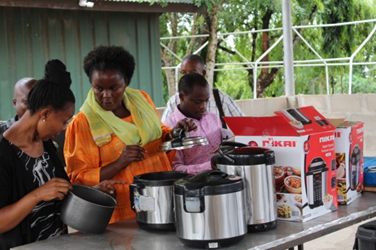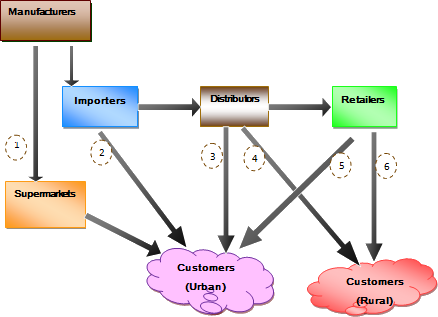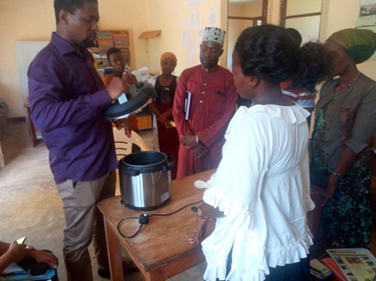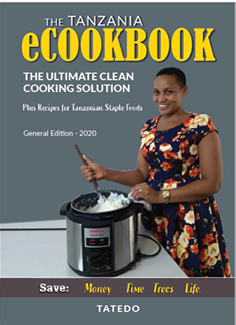Modern Energy Cooking Service Project on the Approach to Designing Delivery Models of Modern Energy Cooking Services in Tanzania
- Category: Projects
- Published: Sunday, 31 May 2020 10:36
- Written by Webmaster
- Hits: 3381
Introduction
Access to affordable and reliable Cooking Energy services is part of SDG 7 targets intending to increase the segment of population with primary reliance on clean cooking appliances with low emission. The transition from traditional to modern cooking energy in Tanzania has been dominated by gradual and slow ascends on the energy ladder. The majority of the population are still at the low levels of energy ladder using solid biomass based fuels, some, as income increases, moves upwards to modern energy sources and few are using electricity, and however, fuels stacking are broadly practiced.
According to eCook study performed by TaTEDO, GAMOS, University of Surrey and Loughborough University in 2018, it was noted that cooking with electricity is competitive, even cheaper than cooking with LPG, kerosene, or charcoal in urban, peri-urban and rural settings.
MECS TRIID Project
TaTEDO with support from MECS-TRIID Challenge Fund implemented a project on Approach to Designing Delivery/Business Models of Modern Energy Cooking Services in Tanzania. The project aimed at finding out how cooking with high efficient modern energy appliances could be scaled up to the majority of the population in Tanzania.
 The project was implemented in urban and peri-urban areas of Dar es Salaam Region (Ubungo and Kinondoni Districts) and rural area of Gairo district in Morogoro Region where PowerGen Company is currently operating a Mini-Grid Project. The time scale of this project was six months (19 Aug 2018 -28 Feb 2020)
The project was implemented in urban and peri-urban areas of Dar es Salaam Region (Ubungo and Kinondoni Districts) and rural area of Gairo district in Morogoro Region where PowerGen Company is currently operating a Mini-Grid Project. The time scale of this project was six months (19 Aug 2018 -28 Feb 2020)
The project assessed the entire eCook appliances market systems in order to identify, assess and understand actors, barriers, enablers and drivers to improve the delivery (business model) of modern energy cooking appliances in Tanzania.
The project assessed the following attributes in the cooking energy market system which includes:
- Market chain from manufacturers, suppliers/importers, distributors middle firms to the customers/end-users at the demand side of cooking energy services Socio-economic and cultural context of potential customers or end users of the eCook in the project areas, Support services (awareness, grants, micro-finance, capacity building, etc) Enabling environment (policies, strategies, legislation, tax incentives, etc).
Due to the limited information regarding the above attributes, the project went to selected districts to get information for developing approach for designing modern cooking energy delivery/business models.
Objectives of the Project
The project aim was to assess and understand the entire modern cooking (efficient electric appliances) market systems in order to propose sustainable delivery/business models for scaling up uptake of modern energy cooking appliances in Tanzania.
The project specifically addressed the following objectives:
- Assess and understand the efficient electric cooking appliances market systems i.e. market chain, support services and enabling environment.
- Assess market actors within the marketing chains by assessing supply/imports, distribution, retailers and demand (end users).
- Identify and assess barriers, enablers and drivers in the market chain for improving the uptake of MECS in Tanzania
- Undertake assessment of the socio-economic, cultural and environmental context for introducing high efficient electric cooking appliances in urban and rural settings of Tanzania,
- Identify possible solutions or interventions to overcome market barriers, provide support services and foster enabling environment
- Recommend approach and appropriate delivery or sustainable business models for scaling uptake of modern eCook appliances for different social groups in rural, peri-urban and urban areas
- Prepare implementation plan for piloting the implementation of modern cooking energy delivery/business model in selected urban and rural areas in the next MECS funding support.
Deliverables
The deliverables of the project were:
- Inception report - detailed explanation of the project, methodology and deliverables.
- Three Progress Reports
- Final published Tanzania MECS report – provide final findings
- Tanzania eCook Book –manual for supporting modern cooking services using efficient eCook appliances.
The final report provided recommendations for scaling up clean cooking adoption by different socio-economic groups in Tanzanian communities. The eCook book has been published to support awareness, encourage potential end users and inform different stakeholders the best ways to take advantage of high efficient electric cooking opportunities in the country.
Gender Issues
The project strived to understand the factors that influence adoption of clean cooking solutions and use by women and girls, including design and socio-cultural factors, as well as how time saved from use of clean and efficient electric cooking appliance is spent. The data and analytical assessment from this project is going to benefit women and girls through the development of sustainable delivery models for cooking appliances related to gender and women’s empowerment, including those that utilize effective empowerment tools, such as capacity building, business development, etc.
Research Findings
The research findings from the project indicate that the target markets for EPCs are households and small food business enterprises in both rural and urban areas. The aggregate demand of EPCs is still very low in Tanzania. The factors which were observed and considered to influence the demand of EPCs are awareness of appliance, price

of appliance, seasonality of income, availability and quality of the appliance and income level of customers which determines affordability and prices of substitutes/compliments.
Based on the findings of the project, there are six potential chains for marketing EPCs to the end-users. These are market chains from manufacturers through importers to supermarkets to urban end-users, urban end-users, distributors to urban end-users, distributors to rural end-users, distributors, retailers to urban end-users and distributors, retailers to rural end-users. Most of retailers are at the moment, mini-grid owners who supply EPCs to rural end-users. The following is market chains for EPCs.
The end users of electric pressure cookers who will benefits from modern energy cooking services are categorized into various groups based on their income. These are 1) Low Income Customers, 2) Medium Income Customers and 3) High Income Customers. The most potential customers for electric pressure cookers are type 2 and 3customers (high and medium income segments) and 40% of the type 1(low income customers) especially business persons and individual households with regular monthly income.
There are market barriers observed during implementation of the project. These are low awareness, low affordability due to limited financing for end-users, limited capitals for suppliers, availability of appliances, technical gaps such as after sale services, knowledge to use and cultural barriers related to tastes, perception, preferences and deep fraying.
The support services required for facilitating access of EPCs to end-users include: awareness campaign and promotion of EPCs, capacity building trainings for use, financial support to enhance affordability for end users and investment and working capital for importers, distributors and retailers and after sale services of electric cooking appliances.
The enabling environment is brought about by supportive policies of energy, trade, SMEs, micro-finance, feed-in-tariffs, fiscal and monetary issues and related strategies, programmes and institutional and legal frameworks. These documents among others support the delivery of modern energy cooking services in Tanzania.
 According to this research study, it has been observed that the approach for designing the delivery model for modern energy cooking services will be undertaken through the following steps: 1)Entry Point and Assessment of Potentials, 2) Actors Assessment 3)Identify Potential Customers, Demand and Value Proposition 4) Assess and decide on the Supply Chain (market actors and barriers) 5) Study the Enablers and Determine Support Services to Actors, 6) Design and Test MECS Delivery Model, 7) Optimize, Review and Retest the Delivery Model, 8) Plan and Operationalize Implementation of MECS Delivery Model and 9) Select Implementers.
According to this research study, it has been observed that the approach for designing the delivery model for modern energy cooking services will be undertaken through the following steps: 1)Entry Point and Assessment of Potentials, 2) Actors Assessment 3)Identify Potential Customers, Demand and Value Proposition 4) Assess and decide on the Supply Chain (market actors and barriers) 5) Study the Enablers and Determine Support Services to Actors, 6) Design and Test MECS Delivery Model, 7) Optimize, Review and Retest the Delivery Model, 8) Plan and Operationalize Implementation of MECS Delivery Model and 9) Select Implementers.
The specific focus of this research is an approach for designing Modern Energy Cooking Service Delivery model, which was assessed through analytical framework. The approach is supported by two components: 1) Mapping the Modern Energy Cooking Delivery System and 2) Tools Required for Designing MECS Model. The tools for MECS models include Delivery Model Map, Business Model Canvas, Stakeholder Mapping Tool, Need Assessment Tool and Risk Assessment Tool.
The case studies highlighted for sustainable delivery models were developed according to information and analysis which was obtained from participatory meetings in rural setting with mini-grid electricity users and urban setting with national grid electricity users.
The next steps will build on the implementation of the findings and recommendations of this research project and widen focus of this innovation to other areas. The MECS team at TaTEDO in collaboration with different partners will continue with the efforts of addressing the identified barriers along the market chain and within the enabling environment in order to contribute to the efforts of developing a market of EPCs in Tanzania.
Tanzania eCook Book
The eCook Book for Tanzania was produced at TaTEDO in Dar es Salaam, Tanzania Nairobi and focuses on cooking of different staple foods of Tanzania including energy intensive beans and cereals.
The eCook Book is designed to support people in Tanzania households on how to make more informed choices about the energy and appliances that are more efficient and energy saving. It shows how energy relates to money and time so the household can understand how to save both by using smarter cooking techniques, fuels and appliances. The focus is on electricity and the time/money that could be saved by switching from other fuels.
eCook Book contains a great combination of day to day dishes that are easy to make for everyday home cooking and which will be adopted to use of Electric Pressure Cookers (EPCs). The eCook Book will support the users in food preparation and enable them to use EPCs for eating well cooked and more healthy food with retained nutrients, use of less time in the kitchen, saving money and safety in the kitchen.
The MECS TRIID Final Research Report and eCook Books can be obtained through the following links:
- Approach to Designing Delivery Models of Modern Energy Cooking Services in Tanzania
- The Tanzania eCook Book (English Version)
- The Tanzania eCook Book (Kiswahili Version)
Download Latest TaTEDO Articles about MECS here

